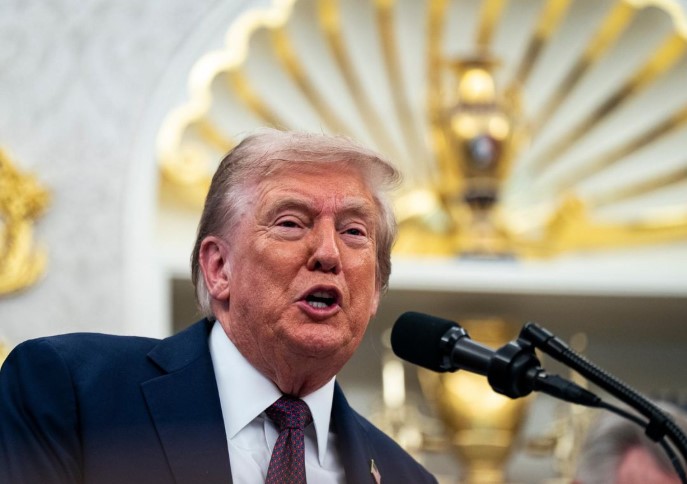The United States launched an attack against a drug-carrying vessel in the southern Caribbean, according to US President Donald Trump. According to Trump, the boat had departed from Venezuela and was operated by the Tren de Aragua gang, a criminal group originally formed in Venezuela.
Rare US Military Operation in the Caribbean
Trump made the announcement on social media and shared a short video clip showing what appeared to be the explosion of a vessel at sea. He said that the strike resulted in the deaths of 11 people and described it as a warning to anyone trying to smuggle drugs into the United States.
In his statement, Trump explained that the attack happened in international waters of the Caribbean while the boat was transporting narcotics toward the US. He affirmed that the operation did not result in any damage to American forces. The president emphasized that the strike was a direct response to the threat of illegal drug trafficking in the region.
The video clip he posted showed a long, fast-moving multi-engine boat traveling across open waters. Suddenly, a bright flash lit up the scene, followed by flames engulfing the vessel. However, the black-and-white footage was not clear enough to confirm the number of people on board or whether it carried visible stashes of drugs.
From Caracas to cartels — DEA chief accuses Maduro regime of fueling America’s drug epidemic
The announcement marks a rare example of a US military operation carried out so close to Latin America and the Caribbean. Washington has long accused criminal networks from Venezuela and neighboring countries of playing a central role in the flow of cocaine and other narcotics into North America.
Tren de Aragua and US Allegations in the Caribbean
The Tren de Aragua gang has become one of the most feared criminal organizations in South America. In a jail in the central state of Aragua, Venezuela, it began over ten years ago. As millions of Venezuelans fled the country’s economic problems over time, the gang’s influence grew internationally, reaching immigrant populations overseas and other Latin American countries.
Tren de Aragua has been accused of inciting violence and drug trafficking by Trump and his administration on numerous occasions. He has also asserted that Nicolás Maduro, the president of Venezuela, controls the organization. A declassified US intelligence report, however, refuted this assertion.
The size and organization of the gang remain unclear. Experts believe it operates in loose networks rather than as a fully centralized group. Even so, its reputation for violence, extortion, and involvement in narcotics has grown steadily.
London Drugs in Crisis: Cyber Incident Forces Urgent Store Shutdown
How the US military verified that the individuals slain on the boat were Tren de Aragua gang members was not immediately clarified by the White House. Questions also remain about the exact destination of the drugs on the vessel. Trump claimed the shipment was bound for the United States, but other officials suggested it might go to Trinidad or another Caribbean destination.
This attack comes as part of a larger US military buildup in the waterways close to Venezuela. Just last month, Washington announced it would boost naval forces in the Caribbean region to counter threats from Latin American drug cartels.
Maduro’s Reaction and Venezuelan Response
Soon after Trump’s announcement, Venezuelan state television broadcast images of President Nicolás Maduro walking through his childhood neighborhood in Caracas. He was seen greeting supporters along with his wife, Cilia Flores. Maduro was “bathing in patriotic love,” according to a television host, as he engaged with citizens on the street.
Speaking to his supporters, Maduro did not directly mention the strike. Instead, he accused the United States of trying to seize Venezuela’s natural resources, especially its oil and gas reserves. He declared that “God is with us” in the face of what he described as imperialist threats. He added that peace in Venezuela would be preserved with sovereignty.
Freddy Ñáñez, Venezuela’s minister of communications, also offered his thoughts on the video that Trump uploaded. He said the footage looked artificial and might have been generated using Artificial Intelligence tools. According to him, the explosion shown in the video appeared “cartoonish” rather than realistic.
Venezuelan authorities have deployed extra troops along the coast. They also reinforced the borders with Colombia. At the same time, they urged civilians to join militias. Officials said this was a response to what they describe as US aggression.
Venezuela blasts U.S. flotilla as “cannon diplomacy” with warships at its doorstep
Trump’s announcement was backed by Secretary of State Marco Rubio. He was leaving for a trip to Mexico and Ecuador. Rubio declined to share details of the strike. But he said the US would continue to target drug traffickers wherever they operate. That includes the Caribbean.
Venezuelan leaders argue Washington exaggerates their role in the cocaine trade. They cite UN reports showing most routes pass through Colombia, Ecuador, and Peru. Meanwhile, cartel violence has escalated in Ecuador. This highlights the wider regional struggle. The Caribbean remains a key trafficking route.

